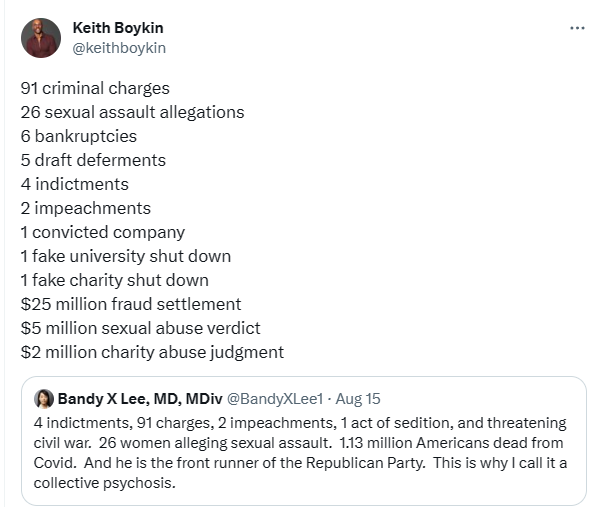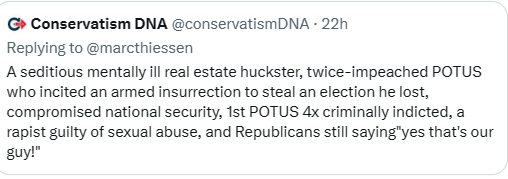The GOP has been telling itself stories for years now. Like this classic:
“What is the downside for humoring him for this little bit of time? No one seriously thinks the results will change,” the official said. “He went golfing this weekend. It’s not like he’s plotting how to prevent Joe Biden from taking power on Jan. 20. He’s tweeting about filing some lawsuits, those lawsuits will fail, then he’ll tweet some more about how the election was stolen, and then he’ll leave.”
We know how that worked out. But the soothing self-talk continued. After January 7, there was a brief moment when the GOP worthies thought that Trump had essentially handled himself. There was, explained Mitch McConnell, no reason for the Senate to convict him because surely Something Else would take care of it.
This has been the essence of GOP Deep Thoughts on how to deal with Trump. Waiting for a Unicorn. An indictment. An asteroid. Maybe an aneurysm. Any damn thing. A deus ex machina that would not require them to anger the base by telling them the truth.
McKay Coppins captured the mindset back in January. Republicans, he reported, “are quietly rooting for something to happen that will make him go away. And they would strongly prefer not to make it happen themselves.”
In his recent book Thank You for Your Servitude, my colleague Mark Leibovich quoted a former Republican representative who bluntly summarized his party’s plan for dealing with Trump: “We’re just waiting for him to die.” As it turns out, this is not an uncommon sentiment. In my conversations with Republicans, I heard repeatedly that the least disruptive path to getting rid of Trump, grim as it sounds, might be to wait for his expiration.
So Ron Desantis raged against Disney, picked fights with the LGBTQ community, crusaded against wokism, and waited for Trump to eat a deadly Big Mac or be indicted. What, after all, was the downside of defending him against the deep state and a “weaponized” criminal justice?
Why not suggest he’d even help Trump defy extradition? Why not humor him and amplify his claims of victimization?
When Trump actually got stronger with every felony charge, DeSantis World privately whispered that maybe everything would change after the Georgia indictments came down, because they would be so . . . something, something, something.
Well, here we are. Let’s review, shall we?
But in the new Quinnipiac poll, Trump still leads DeSantis by (deep breath) 39 points.
Trump gets support from 57% of Republican registered voters, DeSantis gets 18%, businessman Vivek Ramaswamy gets 5% and former Vice President Mike Pence gets 4%. No other Republican candidate gets more than 3% in the national Quinnipiac poll.
The AP/NORC poll shows pretty much the same thing: an overwhelming majority of GOP voters — 63 percent— still want Trump to run again. “That’s up slightly from the 55% who said the same in April when Trump began facing a series of criminal charges.” The Fox News poll gives Trump a 37-point lead over his nearest rival.
To sum up:
And there are no unicorns on the horizon.
But who’s up for a reality check?
Apparently not the GOP, which seems addicted to that sweet, sweet Orange meth. Even so, this should be sobering.
The AP/NORC poll finds that nearly two thirds of Americans — 64 percent — would definitely or probably not support Trump in a general election.
There’s more.
As the Wapo’s Aaron Blake notes, the same poll found that “1 in 5 or fewer Americans said they believed Trump did ‘nothing wrong’ in each of his four legal cases.”
Of his role in the Jan. 6 insurrection, 21 percent said he did “nothing wrong.” In both the classified documents case and the Georgia case (the poll was conducted before this week’s indictment there), it was 15 percent. And just 14 percent said Trump did “nothing wrong” in the Manhattan case involving an alleged coverup of hush money payments.
When Blake asked the pollsters to dive into the data to find how many voters thought that Trump did “nothing wrong” in all four cases, they found that the “truest of the true believers in Trump’s denials,” constituted only 7 percent of Americans overall and just 16 percent of Republicans.
Concludes Blake:
What that suggests: Despite the GOP standing by Trump, there is a significant and growing universe of right-leaning voters who object to his actions in these cases. They might continue to stick with Trump out of partisan loyalty or even a belief that he’s being persecuted — only about 1 in 10 Republicans in these polls generally believe he broke the law — but that doesn’t mean they approve.
**
A new poll shared exclusively with Semafor finds that Donald Trump’s legal troubles could prove fatal in a general election. . . .
It finds that 24% of Republicans say the charges make them less likely to vote for Trump against President Joe Biden — “more than enough to swing a close general election,” according to a memo accompanying the results.
“He is in a much weakened position than he was even compared to 2020, which is the election he lost,” Benenson told Semafor’s Jordan Weissmann.
**
As if you needed it, here’s more evidence that the GOP base has become a cult. In a lengthy story about the DeSantis Slump, the New Yorker’s Benjamin Wallace-Wells includes this nugget:
Even attaching Trump’s name to an otherwise effective message had a tendency to invert the results, this source said. If a moderator said that the COVID lockdowns destroyed small businesses and facilitated the largest upward wealth transfer in modern American history, seventy per cent of the Republicans surveyed would agree. But, if the moderator said that Trump’s COVID lockdowns destroyed small businesses and facilitated the largest upward wealth transfer in modern American history, the source said, seventy per cent would disagree.
Christopher Miller: The War Came to Us
On Wednesday’s podcast, Christopher Miller joined me to discuss his new book, Volodymyr Zelensky, the state of the war, and Ukraine’s existential fight.
You can listen to the whole thing here.
Roger Stone’s Play
A video obtained by MSNBC shows Donald Trump’s former political advisor Roger Stone dictating the rationale behind a plan to undermine the certification of Electoral College votes days before the outcome of the 2020 election was announced.
In the video, Stone, speaking slowly to an associate who is transcribing his words, states that “the final decision as to who the state legislatures authorize the send to the electoral college is a decision made solely by the legislature.”
“Any legislative body may decide on the basis of overwhelming evidence of fraud to send electors to the electoral college who accurately reflect the president’s legitimate victory in their state, which was illegally denied him through fraud,” Stone adds.
Stone concludes by asserting that “we must prepare to lobby our Republican legislatures, by personal contact, and by demonstrating the overwhelming will of the people in their states — in each state — that this may need to happen.”
In other words, the fake elector scheme was basically the Dirty Trickster’s Last Hurrah.
Throwing matches on a kerosene fire
A reminder that toxic rhetoric can have deadly consequences.
A Texas woman has been charged with threatening in a voicemail to kill the federal judge overseeing former President Donald Trump’s criminal case in Washington, DC, over his attempts to overturn the 2020 election.
Abigail Jo Shry called the chambers of Judge Tanya Chutkan on August 5, and left a voicemail message threatening to “kill anyone who went after former President Trump,” according to a criminal complaint.
The death threats also allegedly included racist comment against Chutkan, who is Black. Prosecutors said in court filings that Shry called the judge a “stupid slave n***er” in the voicemail.
Shry is charged with Transmission in Interstate or Foreign Commerce of any Communication Containing a Threat to Injure the Person of Another. She is being held in detention pending trial, according to court documents, and a bond hearing has been set for September 13.
“If Trump doesn’t get elected in 2024, we are coming to kill you, so tread lightly, b*tch,” Shry said in the message, according to the complaint. “You are in our sights, we want to kill you.”
The DeSantis Effect
Via the Chronicle of Higher Education: “Chaos reigns at New College of Florida as fall semester nears.”
When a committee of the New College of Florida Board of Trustees met in July, a whopping 36 faculty members had already left since Florida Governor Ron DeSantis initiated a conservative restructuring of the institution in January. That number has subsequently grown to more than 40, Amy Reid, the sole faculty member on the board, told Inside Higher Ed….
This fall will mark the first new academic year since DeSantis began his overhaul of the liberal arts college, the smallest public institution in Florida, by appointing six new conservative trustees. Many students were nervous about returning to NCF under the new leadership, which in short order fired former president Patricia Okker, axed the diversity, equity and inclusion office and denied five faculty members tenure. But as the fall semester inches closer, it is becoming increasingly apparent just how much dysfunction New College’s students will have to contend with this year.
The shrinking course catalogue isn’t their only worry. With just under two weeks until the academic year starts, students are also reckoning with last-minute class cancellations, poorly communicated housing changes and concerns about their ability to complete their mandatory senior capstone projects.
Quick Hits
1. What Do the Polls Really Tell Us About Americans’ Support for Ukraine?
Cathy Young in today’s Bulwark:
But do the CNN findings tell us anything new? A look at polls over the course of the past year shows that fluctuations in support levels are normal. In late January, an Associated Press/NORC poll found that 48 percent said they favored the United States providing weapons to Ukraine, while 29 percent were opposed and 22 percent were undecided. In June, however, a Reuters/Ipsos poll showed 65 percent of respondents (including 56 percent of Republicans) saying that the United States should continue arming Ukraine. In another June poll of 1,203 registered voters by Hart Research, three quarters felt that the United States should continue providing weapons to Ukraine: 40 percent agreed “strongly,” 34 percent with “mixed feelings.”
2. Back-to-School Season a Reminder of the Continuing Crises in K-12 Education
Bruno Manno in today’s Bulwark:
AS SUMMER BREAK ENDS and children across the United States return to the classroom—with most public K-12 schools reopening their doors by the end of August—it will feel for millions of families like a return to normalcy. But it’s important not to forget that our schools and students are still suffering from the aftereffects of the last few years’ turmoil: the pandemic-induced closures, mask mandates, social distancing, and distance education—resulting in lasting problems that some researchers have taken to calling “education’s long COVID.”








The VOTERS are the problem, Charlie. Four decades of their brains being poisoned by talk radio and Fox News has turned these voters into hateful little assholes. I’m not even sure they would change if they suffered repeated electoral defeats. Thanks the the Courts, they can live in these little bubbles all across the country without any care of Democrats being able to do anything to help the people that these voters hate so much.
Correlation is not always causation. I agree that to some extent, the indictments have made R voters dig in and support him. But at the same time, DeSantis has imploded all on his own. He’s a terrible candidate and everyone sees that now.
My view is that Trump’s support is not solid at all, even though he’s the runaway leader. Most voters still aren’t paying attention and that 64% number that won’t or probably won’t vote for him in the general says a lot.
One of these trials will have ended in a conviction by Nov 24 and most voters aren’t going to vote for the guy already convicted and facing more. So much more is going to happen in the next 12 months. Trump will likely be the nominee, but he won’t get more votes than in 20.